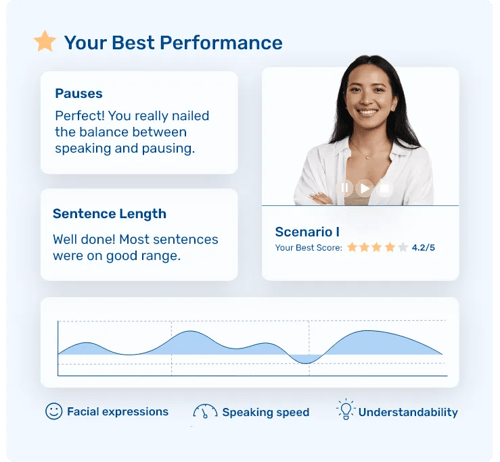Is cold calling dead? Do cold calls actually generate leads?
With a shift in sales and marketing approaches in recent years and a growth in digital and inbound sales strategies, cold calls may at first seem like a less effective way for a sales team to close a deal or build a business alliance.
But despite the plethora of digital communication modalities at our disposal, which has resulted in changing consumer behaviors and regulations related to privacy and telemarketing, the personal interactive aspect and human touch of cold calling remain integral and essential sales practices.
According to Salesforce, cold calling still remains a favorable tactic for connecting to potential prospects for the following reasons:
- First of all, a telephone response will give you a quick assessment of whether a prospect is worth pursuing.
- Second, emails can easily be deleted, marked as spam, or otherwise filtered out (or, if they are opened, ignored since they have the "mass email" feel).
- Thirdly, it's crucial to keep in mind that older and more senior decision-makers may very well respond more favorably to a telephone connection. Younger sales professionals tend to favor digital communications.
Today, organizations that are able to effectively integrate cold calling training with modern technologies, leverage data analytics, and ultimately train reps to devise personalized approaches will be those that find success in generating leads, fostering genuine relationships, and propelling revenue.
In this article, we'll dive into how you can make sure your reps' skills are honed so they are making cold calls that generate real leads.
What's in this post:
What is cold calling?
Firstly, the basics. What exactly is cold calling?
Cold calling is essentially calling or personally meeting with people who have never heard of you, your company, or your product (and thus, have never shown interest in your offer before) in the hopes that they become a lead.
The first records of cold calling date back all the way to the 1870s with John Patterson, the founder of the National Cash Register (NCR) Company, where Patterson's sales management techniques lead NCR into the dominant force in its industry, and simultaneously those techniques had a major impact on the development of modern selling.
Even though Patterson's cold prospecting was typically conducted in person, as opposed to over a call, the foundation of how sales reps approach cold calling is still relevant and accurate, and cold calling remains an indispensable cornerstone of sales representatives' toolkit still today.
If he objects, find out why, answer his objections and again prepare him for signature.... Make the merchant feel that he is buying because of his own good judgment... Concentrate your whole force on one good strong point, appeal to judgment, get him to acknowledge that what you say is true, then hand the pen to him in a matter-of-fact way and keep on with what you were saying. This makes signing the logical and obvious thing to do.
- John Patterson, founder of the National Cash Register (NCR) Company.
Today, cold calling is still heavily used as a strategic outreach method where a sales team hopes to forge unsolicited relationships with prospects and stakeholders and promote offerings.
What is cold calling training?
Cold calling training courses are programs created to teach the process of uninvited business communication. Like any form of training, cold calling training is an integral part of a sales team's toolkit.
This instills a broad skillset that includes, but is not limited to:
| Cold-calling training scenarios | Details |
| Communication skills | Clear, articulated offer as well as understanding client needs. |
| Strategic prospect research | Who are you talking to, what are their interests? |
| Rapport-building | Establishing genuine relationships with potential prospects to build trust. |
| Product/service knowledge | Understanding what you are offering to the core. |
| Handling rejection | Gracefully handling rejection, without losing confidence. |
| Objections practice | Turning objections into discussion opportunities. |
| Closing techniques | Leading the conversation to the desired outcome. |
| Emotional intelligence | The ability to recognize and understand the emotions of customers. |
| Taming cold calling anxiety | Cold calling isn't everyone's cup of tea, let's be honest. |
These courses and skills collectively empower sales professionals to engage in effective cold calling. From establishing the first point of contact, leading the conversation with a fascinating narrative, to highlighting the value proposition, when sales reps train the core cold calling skills, reps will be able to make their own calls, boost sales effectiveness and foster genuine relationships in today's fast-paced and competitive business landscape.
Why is cold calling training so important?
Whether we like to admit it or not, cold calling is an integral sales technique for sales reps.
But most of the time, successful cold callers aren't born. They undertake continuous cold calling courses and cold calling training sessions before being able to truly master the cold calling process and generating a lead.
It isn't simply picking up a phone, reaching the potential prospect, and then having a lead.
It takes an average of 1.5 hours of cold calling per day for 5 days to win one appointment.
Moreover, the average cold calling success rate is just 2%. Too often, sales reps take advantage of the freedom to contact prospects, make pitches too early before doing the right research, and spam the system.
Call terminations, hang-ups, and verbal assaults are just a few of the reactions that cold calling can elicit. But the success rate of cold calling and conversation quality can both be significantly increased by using modern software to train sales reps.
What is the best way to train reps in cold calling?
Like any other sales training courses, cold calling training courses necessitate a strategic integration of essential components in order to get sales reps to successfully retain the learned information from training.
So what are the essential components of cold calling training for selling well? How should sales leaders make sure their cold calling training efforts are reaping the rewards and helping a sales rep become a cold calling expert?
Here are our 5 tips for cold calling training success:
1. Continuous reinforcement and practice
Gone are the days of annual sales training workshops.
Today, keeping your sales rep's skills sharp and up to date is all about on-demand, continuous availability of training resources, and this is no exception for cold calling training.
To make sure your reps are always prepared to get to know customers, foster genuine relationships, and lead conversations to desired outcomes, sales teams need continuous access to cold calling training.
2. Realistic cold call training with role-playing
Realistic role-play scenarios are an excellent way for sales teams to simulate actual cold calling situations, allowing reps to practice their skills, and refine their approach.
Sales reps can be in an immersive and dynamic training environment where they can prepare themselves for real-world scenarios they'd likely encounter during a typical cold call (i.e. communicating a value proposition, handling objections, rapport building) before they interact with a real customer in a cold call.
One of Germany's largest automobile manufacturers makes sure their sales reps are equipped with the skillset they need through AI-powered role-play training platforms, Retorio. With Retorio's video training simulations, the company's reps are able to engage in dynamic, realistic client conversations in a virtual setting.
This way, by the time the sales rep is faced with a real prospect, they have built the confidence as though they have executed the conversation flawlessly countless times before.
3. Real-time feedback on performance
As the name suggests, real-time feedback refers to giving sales reps feedback post-training that is delivered directly after the training is completed, i.e. when training is still fresh in rep's minds.
Real-time feedback is crucial since it enhances real-time performance.
This way, sales reps are readjusting their priorities as needed and enables them to learn from their errors and modify their behavior while it's fresh on their minds.
With AI-powered training platforms, companies are able to implement real-time feedback on training and scrap the annual performance reviews or feedback sessions.
This way, sales reps are able to receive feedback not only instantly, but in a psychologically safe environment where they are likely to take on board the feedback.
4. Provide training feedback that is personalized
Along with feedback being instant, another unparalleled aspect that shouldn't be forgotten is the personalization of feedback.
In order to provide targeted counsel that targets each sales representative's unique strengths, weaknesses, and areas for progress, personalized feedback is essential in cold call training.
Want to learn further about how you can master providing personalized feedback to successfully upskill your employees? Read here!

5. Utilize the capabilities of AI (artificial intelligence)
Cold calling training can be made substantially more effective by utilizing AI, hence more and more companies globally are harnessing the transformative potential of AI to streamline practices and revolutionize their L&D practices.
For instance, AI can enhance learner engagement and effectiveness during sales training sessions through:
- Performance benchmarking
- Real-time feedback
- Data-driven insights
- Predictive analysis
Successful cold calling training is a blend of personalized feedback, consistent practice, and a focus on key skills, such as objection handling and leading the conversation to desired outcomes.
By tailoring training to realistic scenarios and providing actionable guidance, a salesperson can build the confidence and proficiency needed to excel in cold calling and more sales endeavors.
Retorio's AI-powered Behavioral Intelligence Platform utilizes cutting-edge AI learning technology to make sure sales teams are equipped with the essential skills, including cold-calling sales techniques, to prepare reps to handle any conversation with ease.
Sales reps can access Retorio's platform from any device, whenever they like, and be immersed immediately in an AI-powered role-play scenario of a sales scenario they'd likely face on the role. Retorio analyzes the subtle behavioral cues and provides personalized feedback for improvement.
The AI-powered training platform ultimately ensures that companies globally are arming their sales talents with the expertise needed to confidently close deals, and create, and secure revenue, propelling them toward unparalleled success in today's competitive market landscape.

Want to see how Retorio's sales training platform could benefit your sales team and ensure they're prepared to master any upcoming cold call? Check out Retorio's platform now and see for yourself!
Cold calling isn't about conducting a requirements analysis, making a proposal, or closing a deal.
The objective of cold calling is to strike up a discussion, foster a relationship, and provide a value proposition, in hopes of turning them into a lead.
Closing a deal isn't about giving a 30- to 60-second elevator pitch in which you disclose all of your facts upfront. Instead, experienced sales reps write call scripts that are designed to pose questions that elicit known responses. This back-and-forth aids in shifting the prospect's mindset and raises the chances of getting a meeting.
Cold calling isn't about conducting a requirements analysis, making a proposal, or closing a deal.
The objective of cold calling is to strike up a discussion, foster a relationship, and provide a value proposition, in hopes of turning them into a lead.





